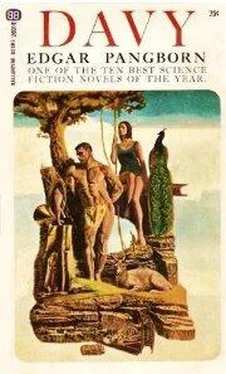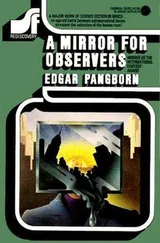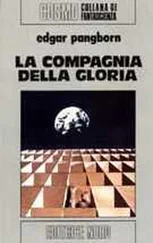“And so then?”
“So nothing, Jackson, nothing special except they do say he a’n’t come down yet, not to this day.”
I had to go over then, or not at all. My good white loinrag helped, but crossing the immense twenty yards between me and the musicians, my knees quivered, and my hands too, as I lifted out the golden horn and let the sunlight touch it; however, the way their faces gleamed with interest and excitement at seeing the horn cleared away my jitters and left me free to be another friendly human being myself. I said: “Can I make some music with you?”
The kitten with the dangerous lock of hair on her forehead and the quail with the bedroom lips were suddenly all business and no mockery. Music was serious. Bonnie asked: “Wherever was that made? Isn’t it Old-Time?”
“Yes. I a’n’t had it long. I can only play a few airs.”
“Bass range?”
“Nay, seems best in the middle — I know there’s notes on both sides I can’t play yet.”
Somebody said: “Boy ’pears to be honest.” I’d felt all along I was being watched from under that straw hat.
The girls paid Stud no attention. “What airs do you know?” Minna Selig asked, and I learned she possessed a bedroom voice too, but right now she was all business, like Bonnie.
“Well,” I said — “well, ‘Greensleeves’ — ‘Londonderry Air’—” Minna’s soft-voiced gut-string banjo immediately sang me a few small chords, and I went wandering into “Greensleeves” with of course not the dimmest notion of what key I was using, or of harmony, or of how to adapt myself to another performer. All I had was the melody, and a natural feeling for the horn, and some guts and a whole lot of good will, and a keen ear, and a tremendous admiration for the way the neat black-haired girl sat there cross-legged with her banjo and her bedroom thighs. Then right away Bonnie’s mandolin arrived, laughing and crying silver-voiced; her big gray eyes played games with me — that didn’t distract her from the music, for she could slay a man with those things and never need to give a moment’s thought — and her racing fingers gave my playing a translucent trembling background all the way through to what I supposed was the end.
The white-haired drummer had swung his arm to beckon a friend or two. People were coming out of the wagons. The flute-player and the cornet man had given up their card-game and were just standing by, listening, thinking it over. So well was the horn responding to me, for a minute I was in danger of thinking it was my playing that drew them and not the Old-Time magic of the horn itself. When I play nowadays that may be true; it can’t have been true that day, though even sweet sharp Bonnie said later on that I did better than any ignoramus had a right to.
When I had (I thought) finished the melody, Minna’s hand pressed my arm to check any foolishness, and away went Bonnie’s mandolin shimmering and heartbreaking to find the melody on the other side of the clouds transfigured by a tempo twice as fast and dancing in the sun. Someone behind me had brought a guitar, which now was chuckling agreeably about the fun Bonnie was having up there. And Minna was intently humming three notes very close to my ear, just audible to me, and whispering: “Play those on your thing real soft when she goes to singing. Trust your ear how and when to play ’em. We’ll goof some but let’s try.”
Do you know, we didn’t goof, much? I was ready when Bonnie’s light soprano soared, and Minna unexpectedly came through with a contralto smooth as cream. Well, those girls were good and double good. They’d been making music together since they were Rambler babies, besides having a rare sort of friendship that no man could ever break up. I never knew whether they were bed-lovers. Pa Rumley was a little down on such variations, I suppose a hangover of the usual religious clobbering in childhood, so it was a question you didn’t ask. If they were, it didn’t turn them against the male half: I had both saying oh-stopdon’t stop after a while, and they were both all the more delicious for not taking me too seriously, since we were not, as people call it, in love.
When Bonnie sang a second verse of “Greensleeves” I heard something more happen along with that guitar. Intent on making my horn do what I hoped they wanted, I felt the addition only as a flowing, sustaining chordal murmur, almost remote although I knew the singers were standing quite close behind me. All our best were there — Nell Grafton and Chet Spender and handsome Billy Truro, the only tenor I ever heard of who could also play Romeo and skin mules. And for the down-in-the-cellar thunderpumping bass we had Pa Rumley himself.
Bonnie wasn’t playing while she sang, but holding her mandolin away, her other hand on my shoulder bedam — never mind, Minna had one on my knee, and some of that was to make a romantic picture for the crowd that was increasing out there in the road, but most of it was real. Bonnie somewhere had learned to sing without too much distorting the charm of her rounded, heart-shaped face — well, with nice teeth, ravishing complexion and brilliant eyes, who’d care if she did have to let the daylight in on her tonsils for some of the big notes? And by the prettiest accident, that day she was wearing a green blouse with long sleeves — you’d have thought the whole show had been planned a month in advance, and I’m sure the yucks believed it was.
When the song was done, and she’d waved and blown a kiss to the crowd, which was stomping and clapping, even a few of them snuffling — why, didn’t she grab my shirt to pull me on my feet? “C’m’ on, kid!” she said — “they love you too.”
There was a dizzying pleasure in it, not spoiled by my knowledge that most of the excitement was for Bonnie and ought to be. Yes, I liked it, and I was growing up, I wasn’t too demarbleized—
* * *
Nickie and Dion still quarrel occasionally about correcting the places where I goof the spelling. I can’t interfere much, because I did ask them to, away back when I started this book. The last time I heard them beating away at it was very recently, in fact only a few minutes ago, I can’t think why. I had dozed off in the sunshine or appeared to, and I heard Nickie ask Dion how he could be sure I hadn’t meant to write it that way. “Can’t,” he admitted, “and even if I could, why should I be elected to defend the mother tongue against the assaults of a redheaded songbird, politician, hornplayer and drunken sailor? Hasn’t she been raped by experts for centuries past counting, ever since Chaucer made such a bitched-up mess of trying to spell her, and doesn’t she still perk?”
“A heartless, mean and lazy brute,” said Nickie. “I hate you, Di-yon, the way you can’t even come to the aid of Euterpe who lieth bleeding in the dust.”
“Euterpe — who she?”
“What! You calling me a twirp?”
“No, but—”
“I ’stinctly heard you say ‘You twirp!’ ”
“Miranda — Euterpe was not the God-damn Muse of Spelling.”
“Oh, that’s right. That was Melpomene.”
“Sorry-sorry, she was the Muse of Tragedy.”
“So all right! So English spelling always was a tragedy, so what other girl could handle it, so don’t give me all that back talk or you’ll wake up Davy.”
I’d just perfected a theory of the origins of English spelling, so I woke up officially to share it with them. You see, there was this ancient gandyshank in the dawn of history who had a nagging wife and an acid stomach and chilblains, but English hadn’t been invented, which left him in the demarvelizing position of being unable to cuss. However, the people in charge of politics had passed a revelation to make the alphabet and then chopped it into sticky chunks and passed them around so there’d be enough letters for everybody; so when the old jo’s wife yakked or his feet hurt or his convictions rifted up on him, he’d snatch the alphabet chunks and heave them at the side of a cliff, the only form of cussing adapted to those early days. Centuries later some scholar with a large punkin head and very small bowels of compassion discovered the cliff and invented English right off whiz-pop just like that. But by then all the combinations a decent man would spell had washed off in the rain or the crows had et them.
Читать дальше












